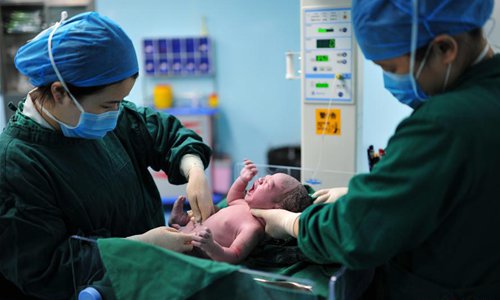China removes regulations stipulating dismissal of civil servants who exceed child limit
By Xu Keyue Source: Global Times Published: 2020/10/13 16:04:20

Midwives take nursing care of a new-born baby at the People's Hospital of Hanshan in east China's Anhui Province, May 12, 2017. About 17.23 million babies were born in 2017, of which 51 percent have an older sibling, according to the National Health and Family Planning Commission. However, the total number of births fell by about 630,000 compared with 2016 while percentage of the population aged over 60 rose from 16.7 percent in 2016 to 17.3 percent in 2017. (Xinhua/Li Changbing)
With the revision of local family planning policies in regions across China, the era of local laws and regulations supporting the dismissal of civil servants and employees of state-owned enterprise (SOE) who have exceeded birth limit has come to an end. Observers said this conforms with the trend of times amid the dropping birth rate and mounting pressure from an ageing society.
On September 22, South China's Guangxi Zhuang Autonomous Region officially amended its regulations on population and family planning, now saying that civil servants and SOE employees who exceeded the child limit must be punished according to law instead of "being expelled according to law."
Similar revisions were also made in Ningxia Hui Autonomous Region in Northwest China in June.
Previously, many other regions in China including Guangdong and Hainan provinces in South China had scrapped the dismissal punishment for excess births.
The regulation adjustment is a part of reforms to China's local family planning policy, an official surnamed Wu who has worked in the local department of population and family planning policy in Shangrao, East China's Jiangxi Province, for more than 20 years, told the Global Times on Tuesday.
Since 2016, all Chinese couples have been allowed to have two babies under the two-child policy, bringing an end to 40 years of the one-child policy.
Since then, China has continuously relaxed its fertility policy amid the country's declining birth rate and mounting pressure from its ageing society, Wu said.
Removing the dismissal punishment is a sign of the further relaxation of the family planning policy, Wu noted.
The relaxation can encourage couples to have more children, thus relieving the pressure on children to support parents amid the ageing society and reducing the burden on families that have lost a child, Wu said.
China's family planning policy, introduced in the 1970s, limited most urban couples to one child. China's top legislature, the National People's Congress (NPC), eased this policy at the end of 2013 by allowing couples to have a second child if one of the parents was an only child.
The easing of the policy and related punishments mainly resulted from a change in China's demographic structure, analysts said.
With the overall population exceeding 1.4 billion in 2019, China's birth rate fell to its lowest in nearly seven decades. In 2019, the number of newborns dropped by 580,000 to 14.65 million, with the birth rate standing at 10.48 per 1,000, according to data released by the National Bureau of Statistics in January.
The sixth census in 2010 showed that the number of people above 60 was about 177.6 million, accounting for 13.3 percent of the total population.
With the current low fertility rate, China's population policy is gradually changing from restricting to encouraging fertility, Wu said, noting that the punishments for violating the policy are getting lighter and weaker.
In 2019, the Legislative Affairs Committee of the NPC Standing Committee reviewed the provision in local regulations that stated public officers with more than one child were to be dismissed, and said that such punishments do not fit the new situation of population and economic and social development. As a result, the committee suggested that local authorities start amending the related regulations.
China's demographic development faces growing challenges, as the number of newborns is expected to continue dropping in the coming years due to structural adjustments, analysts predicted.
Bearing in mind that more and more young people are unwilling to get married or have children, analysts suggested China come up with more policies to encourage couples to have children in order to overcome these demographic challenges.
RELATED ARTICLES:
Posted in: SOCIETY